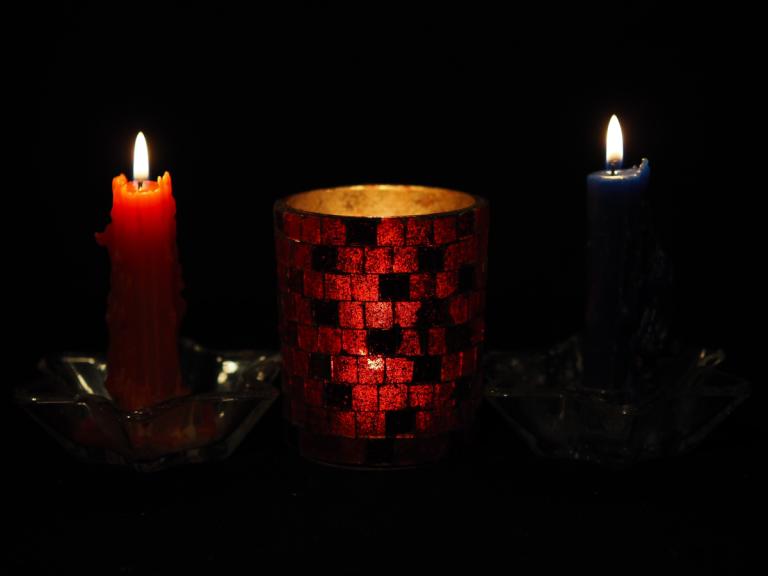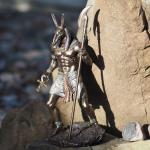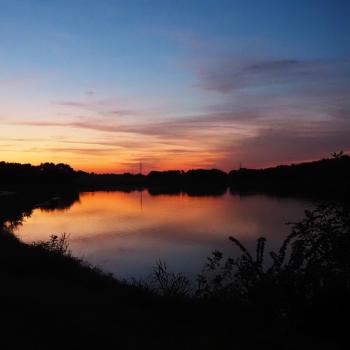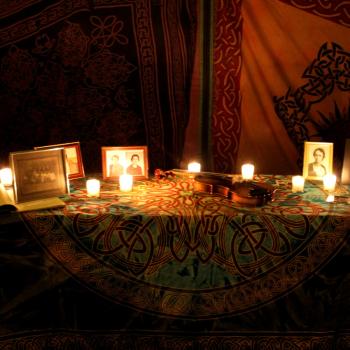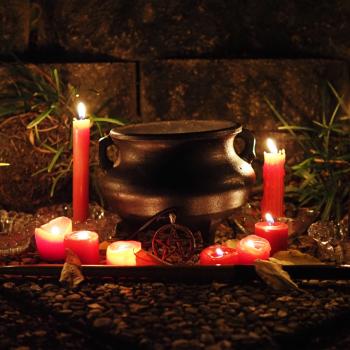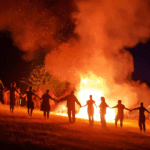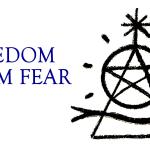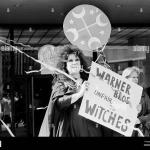After I reviewed Evangelical blogger Anthony Costello’s new short book The Return of Paganism, Anthony responded on his own blog. His response was polite and mostly fair. While I’ve made some comments in an attempt to clarify some of my positions, I haven’t written a full rebuttal, and I’m not likely to do so. We’re already to the point where we have insufficient common ground for an on-going dialogue.
I do want to use one of his responses as a jumping off point for something I think is relevant for all of us – Pagan, Christian, or those on any religious or spiritual path. That’s the role of religious experience in epistemology – how we know what we know.
In his book, Anthony quotes from Handbook of Contemporary Paganism, an academic book from 2009 (that’s priced like an academic book, unfortunately). He relays a story recorded by anthropologist Susan Greenwood of Jo Crow, who participated in an ecstatic event called the “Wild Hunt Challenge” in England. Here is Jo Crow’s story:
Wolf came inside me. It was terrifying. He was right in my face, standing on his hind legs staring at me face to face . . . I smelt his breath; his fangs were dripping. He was going to devour me. He said, “You have to let me in. You let me in once before.” On another occasion, in a dream I had mated with wolf on a village green. It was an ecstatic and wonderful experience. He showed me this dream and, although I was quivering with terror, I allowed him in. He came behind me and went into me at the base of my neck. I became filled with wolf and went on the Hunt. I ran with the Wild Hunt and I went on the rampage. I was taken by the Hunt.
When I came off the downs, one guy could see that I was not out of wolf and tried to bring me back. He joined his forehead to mine to try to call me back but wolf came out of me and almost bit his head off. Eventually I went to bed and I still had wolf in me and every time I looked in a mirror I saw wolf. I still had wolf inside me and came back down later. Sometimes he comes as a companion but does not sit inside me. Wolf helps me to walk in two worlds.
After relaying the story, Anthony said:
I will let the reader discern for themselves whether they think experiences of this sort are: a) a rational way of knowing whether something is true, and b) whether or not it is even good to pursue such experiences, especially given what we know about the cognitive structures of the mind, and the fragile nature of our mental health.
The questions Anthony asks are fair. But the context in which they’re presented leads toward a presumed answer.
I’m going to come back to Anthony’s questions. But first, we need to examine the wider topic of religious experiences and what we do with them.
All religions began with religious experience
All religions began somewhere. Some – those called “revealed” religions – have a specific origin point. An angel spoke to Muhammed and Islam began. The Buddha sat under the Bodhi Tree until he received enlightenment and Buddhism began. Wicca has no single moment of birth but it clearly began with the work of Gerald Gardner.
Christianity isn’t quite so clear, but it still has an origin. Some say it began with the teachings of Jesus. Others say it began with the death and resurrection of Jesus. I sometimes say Christianity began with the mystical experience of Saul of Tarsus on the road to Damascus. Whether these events are historical or mythical is unimportant to us here, even if many Christians consider them of ultimate importance. What’s important to us in this post is that Christianity has an origin. All of these varied and diverse religions began with someone’s experience of something greater than themselves.
Other religions are “organic” religions. They’re the product of thousands of years of life among a particular group of people. Virtually all indigenous religions are organic. So is Hinduism, which is the modern expression of the indigenous religions of India. These religions are so old and have so many sources it is impossible to say exactly where they began. They’re the product of many people having many religious experiences over many years.
Some people object to comparing the foundational events of major world religions to someone they’ve never heard of experiencing Wolf in a facilitated event in the contemporary West. I get it – foundational events are sacred stories. But at their core, these events are very, very similar. Someone had a spiritual experience of something that overwhelmed them, and was very meaningful to them. The difference is in what came afterwards.
These things happen more often than most of us recognize. Most of them go nowhere. Some of them are life-changing for the people who have them.
And a few change the world.
Experiences are meaningless until we interpret them
“I heard this.” “I saw that.” “I felt something I’ve never felt before.” This is what a report of a religious experience looks like. It’s the record of a series of sensory inputs.
When I’ve had these experiences, or when I’ve tried to help others make sense of their experiences, the first thing I want to do is to get the raw facts down on paper, before the memories start to fade.
Perhaps that really was the Morrigan talking to me. Perhaps it was another human conversation I could barely hear. Perhaps it was my own imagination. What is objectively true is that I heard something, felt something, experienced something.
Then I had to figure out what it meant.
That’s where the real work begins.
Interpretation requires context
A Pagan, a Christian, and an atheist can have the same experience at the same time and they will interpret them in different ways, because they have different fundamental assumptions about the world and the way it works.
And being “rational” doesn’t mean we default to the atheist’s viewpoint.
Are there many Gods, one God, or no Gods? Do spirits come and go, are they limited to one or two places, or are there no such things as spirits? It’s important that we understand our own foundational assumptions, that we make sure they’re reasonable and helpful, and that they’re what we believe is most likely true and not just what we’ve always been told is true.
Here’s the question at hand: is religious experience one way of knowing (not the only way and perhaps not even the best way, but one way) or is it simply someone’s imagination running wild?
The Protestant, Evangelical, and especially Calvinist Christianity that grew out of the Reformation devalued first-hand religious experience and placed the written word at the top of epistemology. It assumes that your experience is unlikely to be real and may be dangerous, especially if it contradicts a sacred text… which, of course, is simply the written record of someone else’s experiences.
But for most people throughout most of the world throughout most of history, first-hand experience has been appreciated and even treasured.
For some of us, it still is.
Discernment is always necessary
Which is not to say that anything goes. Interpreting our experiences always requires discernment.
We need knowledge about our own tradition, to understand what symbols and metaphors are trying to communicate, and to help us locate our experience in the context of others. We need knowledge of the human brain, to distinguish imagination from actual experience.
And then we have to do the hard work of pattern matching to figure out exactly who is speaking to us and what they’re trying to say.
It’s not easy. It’s best done in the company of other like-minded people. Those who were there can fill in where your memory may be unreliable, or when you flat-out miss something important. Those who’ve had similar experiences can tell you “yes, that sounds about right” or when necessary “I think you’re going down the wrong path.” They can’t definitively say your interpretations are right or wrong, but they can tell you what others in similar situations have done.
I was present when a Seeress was taken over by Loki. What I heard and saw as an observer very closely matched my own experiences with other deities, and my second-hand experiences when others have had them. The fact that all these experiences match gives me confidence they’re real.
Over the years, my own experiences and the experiences of others have proven to be meaningful and helpful, over and over again. So when I hear and see something that “sounds about right” I pay attention.
Back to Anthony’s questions
I want to go back to the questions Anthony Costello asked and address them directly.
He asked is this “a rational way of knowing whether something is true”? That depends on what you mean by “rational.”
If by “rational” you mean that it fits into a materialist worldview, then the answer is no. But in a materialist worldview, Saul of Tarsus’ experience of Jesus is equally invalid, as are the experiences of other foundational figures of the early Church.
But in an animist worldview where spirits are real and they can and do communicate with us, then the answer is absolutely yes. This is very rational, because it accurately and meaningfully matches cause and effect.
It doesn’t tell us the whole truth. I can’t tell you everything about the Morrigan because I’ve experienced her in ecstatic communion. Maybe I missed something. Maybe I made a mistake in my interpretation.
But these experiences give us a piece of the truth, and that’s something we can build on.
Ecstatic experience is not safe
Anthony’s second question asks “whether or not it is even good to pursue such experiences, especially given what we know about the cognitive structures of the mind, and the fragile nature of our mental health.”
Is it good? Yes, absolutely. The benefits are tremendous, and for religions as a whole (though not necessarily for all practitioners) they are essential – otherwise the religions become spiritually stagnant.
Is it safe? Absolutely not.
The Christian tradition is filled with examples of people who had ecstatic experiences and the difficulties – both spiritual and physical – those experiences caused. Saint Teresa of Avila is one of many.
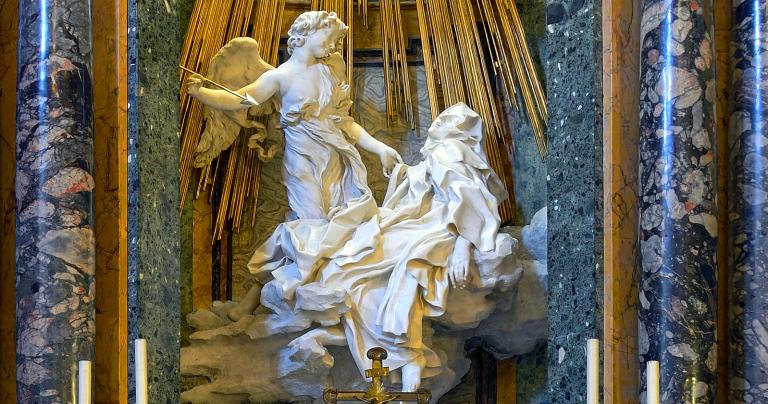
Shamanic practitioners (by which I mean spirit workers in indigenous traditions, not suburban Westerners who took Michael Harner’s courses) often speak of being “unmade and remade” – usually with physical injuries and illnesses.
I’ve been OK with ecstatic experiences, but that’s not because I’m special or favored or because I’m doing it right and other people are doing it wrong. I’m simply not allowed to go too far. I’m required to keep one foot firmly in this world, so I can speak reasonably of things our materialist mainstream society considers unreasonable. But I’ve gone deep enough I know this much:
The line between ecstasy and insanity is exceedingly thin.
Do anything else if you can. But if you have to do this, nothing else will suffice.
How we know what we know
Ecstatic experience is one way of knowing, especially knowing about the Gods.
We have an experience, we interpret it, and we try to figure out what it means. We talk to others who’ve had similar experiences, we compare notes, and we see what we can learn from each other.
We compare our experience to the lore – to the stories and traditions of our ancestors. We understand that lore is the record of someone else’s experiences that have stood the test of time. They are treasures, but they are not infallible and they are certainly not intended to be read literally.
We understand that we are part of a living tradition – our Gods speak to us just as they spoke to our ancestors.
And then we take what we learn and put it into practice. Does it make our lives more meaningful – even though it may make them harder? Does it help us deal with the Big Questions of Life? Does it fit into our metaphysics – our model of the world? In short, does it work?
If it doesn’t, we drop it and we try something else.
But if it does, we keep doing it.
And slowly, step by step, we’re building a modern Pagan polytheist tradition that will do for us what the religions of our ancestors did for them.
And that’s a very good thing.


